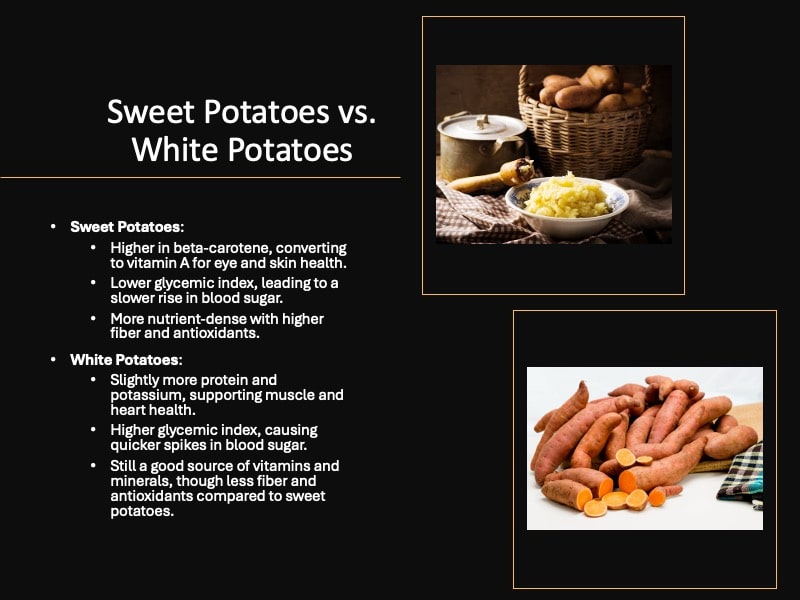Top 5 Health Benefits of Sweet Potatoes & Easy Cooking Guide
Sweet potatoes aren’t just a tasty addition to your meals—they’re a nutritional powerhouse with a unique mix of vitamins, minerals, and antioxidants that support almost every aspect of your health.
Rich in beta-carotene, which converts to vitamin A in the body, sweet potatoes play a critical role in immune function and skin health.
These vibrant root vegetables don’t just provide great flavor; they also fuel your body with sustained energy, enhance gut health through their high fiber content, and support balanced blood sugar levels.
Whether you’re aiming to boost your daily nutrition or seeking natural ways to elevate your overall well-being, sweet potatoes are a go-to choice that delivers benefits for all ages.
Nutritional Properties of Sweet Potatoes
Sweet potatoes are rich in nutrients that make them a powerhouse of health benefits. A medium-sized sweet potato (about 150 grams) typically contains:
- Calories: Approximately 112 calories
- Carbohydrates: 26 grams
- Fiber: 4 grams
- Protein: 2 grams
- Vitamin A: Over 400% of the Recommended Daily Intake (RDI)
- Vitamin C: 37% of the RDI
- Potassium: 15% of the RDI
- Manganese: 16% of the RDI
The high content of beta-carotene, which converts to vitamin A in the body, is one of the primary reasons sweet potatoes are renowned for their health-promoting properties.
Health Benefits of Sweet Potatoes
Sweet potatoes bring so much goodness to the table—helping your skin glow, your gut feel great, and your energy stay steady throughout the day.
Packed with antioxidants and fiber, sweet potatoes work wonders behind the scenes, supporting everything from a strong immune system to a happy digestive system.
If you’re looking for a simple, natural way to make your meals healthier and more satisfying, sweet potatoes might just be your new best friend.
Supports Eye Health
The beta-carotene in sweet potatoes is crucial for maintaining good vision.
Vitamin A deficiency is linked to night blindness and other vision problems, making this vegetable beneficial for eye health.
Promotes Digestive Health
Sweet potatoes are an excellent source of dietary fiber, which aids in digestion and promotes regular bowel movements.
This fiber plays a crucial role in maintaining a healthy digestive system, preventing constipation, and supporting overall gut function.
Even more, sweet potatoes are a natural source of prebiotics, meaning they help feed the beneficial bacteria in your gut microbiome.
The fiber in sweet potatoes, particularly resistant starch, is broken down by these good bacteria, leading to the production of short-chain fatty acids that improve gut health and reduce inflammation.
By promoting a balanced gut microbiome, sweet potatoes can enhance digestion, boost immune function, and even contribute to better mental health.
Regulates Blood Sugar Levels
Despite their sweet taste, sweet potatoes have a low glycemic index (GI) compared to regular potatoes.
This means they release sugar slowly into the bloodstream, preventing blood sugar spikes and promoting stable energy levels.
Enhances Skin Health
Sweet potatoes are one of the best foods for skin health.
The high levels of vitamins A and C in sweet potatoes support skin health by promoting collagen production and reducing signs of aging.
Regular consumption can help improve skin texture and protect against damage from UV rays.
Heart Health Benefits
Potassium in sweet potatoes plays a vital role in controlling blood pressure by counteracting the effects of sodium.
Additionally, their fiber content helps lower cholesterol levels, contributing to overall cardiovascular health.
Supports Muscle Growth
Sweet potatoes are a great source of complex carbohydrates and essential nutrients like potassium and magnesium, which are crucial for muscle function and recovery.
The slow-releasing carbs in sweet potatoes provide sustained energy during workouts, making them one of the best carbs for bodybuilders or athletes.
Boosts Immune System Function
Rich in antioxidants like beta-carotene and vitamin C, sweet potatoes help to strengthen your immune system by reducing inflammation and protecting the body against harmful free radicals.
These antioxidants play a key role in supporting your body’s natural defense mechanisms, helping you fight off infections and recover more quickly from illnesses.
How Many Sweet Potatoes Should You Eat a Day?
The number of sweet potatoes you should consume daily depends on your individual dietary needs.
However, most people can benefit from eating one medium-sized sweet potato per day, which provides a good balance of essential nutrients without overloading on carbohydrates or calories.
Should Anyone Avoid Sweet Potatoes?
While sweet potatoes are generally safe and nutritious for most individuals, certain people may need to moderate their intake:
- Kidney Stone Risk: Sweet potatoes contain oxalates, which can contribute to kidney stone formation in susceptible individuals. Those with a history of kidney stones should consult their healthcare provider before increasing their sweet potato consumption.
- Allergies: Though rare, some individuals might be allergic to sweet potatoes. Signs of an allergy may include itching, swelling, or digestive discomfort.
Sweet Potatoes vs. White Potatoes

Sweet potatoes and white potatoes are both nutritious root vegetables, but they have distinct differences that make them unique.
Sweet potatoes are higher in beta-carotene, a powerful antioxidant that converts to vitamin A in the body, promoting eye and skin health. They also have a lower glycemic index, which means they cause a slower rise in blood sugar levels, making them a better choice for those managing blood sugar levels.
On the other hand, white potatoes offer slightly more protein and potassium, which are beneficial for muscle function and heart health. However, they have a higher glycemic index, leading to quicker spikes in blood sugar.
Both types of potatoes are excellent sources of vitamins and minerals, but sweet potatoes are often considered the more nutrient-dense option due to their higher fiber and antioxidant content.
Organic vs. Non-Organic Sweet Potatoes
Choosing between organic and non-organic sweet potatoes can impact your health and the environment. Organic sweet potatoes are grown without synthetic pesticides and fertilizers, making them a safer and more eco-friendly option.
While non-organic sweet potatoes are still a healthy choice, organic varieties are preferable if you’re concerned about pesticide exposure.
Benefits of Organic Sweet Potatoes
- Fewer pesticide residues
- Lower environmental impact
- Often richer in nutrients
Non-Organic Sweet Potatoes Considerations
- Typically more affordable
- Washed and scrubbed to reduce pesticide exposure
- Still packed with essential nutrients
How to Cook & Prepare Sweet Potatoes for Maximum Benefits & Enjoyment

To truly tap into the health benefits of sweet potatoes, how you cook and prepare them makes all the difference.
Certain methods help to preserve the vitamins, minerals, and antioxidants that make these root vegetables so nutritious, while other methods can diminish their value.
Let’s explore some of the best ways to prepare sweet potatoes to ensure you get the most out of every bite.
Baking Whole Sweet Potatoes
Baking is one of the simplest and healthiest ways to enjoy sweet potatoes. When baked whole, their skin helps lock in moisture and nutrients, making them both fluffy on the inside and crisp on the outside.
Simply scrub the sweet potatoes clean, poke a few holes with a fork, and bake them at 400°F (200°C) for about 45-60 minutes.
Top with a sprinkle of cinnamon or a drizzle of olive oil for extra flavor without adding empty calories.
Mashed Sweet Potatoes
Mashed sweet potatoes are a creamy, comforting side dish that pairs well with almost any meal. For a healthier twist, try mashing them with garlic, a bit of olive oil, and some fresh herbs like rosemary or thyme.
For even more flavor and health benefits, consider using fresh, local butter or ghee in your mashed sweet potatoes.
Both butter and ghee can enhance the dish’s richness while providing beneficial fats and fatty acids like conjugated linoleic acid (CLA) that provide anti-inflammatory and metabolism-boosting properties.
Using high-quality butter or ghee also supports better absorption of the fat-soluble vitamins in sweet potatoes, such as vitamins A and E.
Diced and Baked Sweet Potatoes
Dicing and baking sweet potatoes are perfect for creating crispy, bite-sized pieces that are great as a side dish or salad topper.
Toss the diced sweet potatoes with olive oil, sea salt, and your favorite herbs, and bake at 425°F (220°C) for about 25-30 minutes.
This method caramelizes their natural sugars, giving you a slightly sweet and crispy bite while keeping the fiber and vitamin C intact.
Sweet Potato Fries
Sweet potato fries can be a delicious and healthier alternative to regular fries. To keep them nutritious, slice the sweet potatoes into even-sized sticks, toss them lightly with olive oil, and bake at 425°F (220°C) for about 20-25 minutes, flipping halfway through.
If you do choose to fry them occasionally, using oils with a high smoke point, like sunflower or safflower oil, can be a better option. These oils are more stable at high temperatures, making them less likely to break down and form harmful compounds.
However, baking remains the best method to maintain the nutritional value of your sweet potato fries.
Avoid deep frying, as it adds unnecessary fat and calories, but feel free to season them with paprika, garlic powder, or a touch of black pepper for an extra kick.
Sweet Potato Chips
If you’re craving something crunchy, homemade sweet potato chips are a great option. Thinly slice the sweet potatoes, lightly coat them with olive oil, and bake them at 375°F (190°C) for 15-20 minutes, flipping halfway through.
This method allows you to enjoy the crispiness of chips without the unhealthy oils found in store-bought versions. Plus, they’re a fantastic source of fiber that will keep you satisfied.
Sweet Potato Pie
Sweet potato pie can be a tasty treat that hits your sweet tooth while still offering some health benefits.
Unlike traditional desserts loaded with refined sugars, sweet potato pie relies on the natural sweetness of the vegetable itself. Here’s a simple, healthier sweet potato pie recipe to try at home:
Healthy Sweet Potato Pie Recipe
Ingredients:
- 2 medium sweet potatoes, baked and mashed
- 1/4 cup maple syrup or honey (for natural sweetness)
- 1/2 cup unsweetened almond milk or coconut milk
- 2 eggs
- 1 tsp cinnamon
- 1/2 tsp nutmeg
- 1/2 tsp vanilla extract
- Whole wheat or gluten-free pie crust (store-bought or homemade)
Instructions:
- Preheat your oven to 350°F (175°C).
- In a large bowl, combine the mashed sweet potatoes, maple syrup (or honey), almond milk, eggs, cinnamon, nutmeg, and vanilla extract.
- Pour the mixture into the pie crust and smooth out the top with a spatula.
- Bake for 45-50 minutes or until the center is set and the pie is lightly browned on top.
- Allow the pie to cool before serving.
This version of sweet potato pie is lower in sugar and packed with beta-carotene, fiber, and healthy fats, making it a guilt-free way to satisfy your dessert cravings. It’s a great example of how you can indulge your sweet tooth without compromising on nutrition.
Sweet potato pie can be a fun and tasty way to enjoy the health benefits of sweet potatoes while still treating yourself. It’s the kind of dessert that feels indulgent but is packed with antioxidants, vitamins, and minerals that make it a much healthier option than most traditional sweets.
Whether you’re sharing it as part of your healthy dinner idea for your family dinner or savoring a slice on your own, this pie lets you enjoy the best of both worlds—delicious flavor and a boost of nutrients.
Frequently Asked Questions (FAQs): About Sweet Potatoes
Can I eat Sweet Potatoes Every Day?
Yes, eating a moderate amount of sweet potatoes daily is safe and beneficial for most people due to their high nutrient content.
Are Sweet Potatoes Better Than Regular Potatoes?
While both have their benefits, sweet potatoes are generally higher in fiber, vitamins A and C, and have a lower glycemic index compared to regular potatoes.
What is the Best way to Store Sweet Potatoes?
Store sweet potatoes in a cool, dry, and dark place to maintain their freshness. Avoid refrigerating them, as this can alter their texture and flavor.
This website does not provide medical advice. This website site does contain affiliate links, and purchases may earn a commission.
Read my Medical Disclaimer, Review Disclaimer, and Publishing Policies for more details. Use of this site indicates acceptance of these terms.



